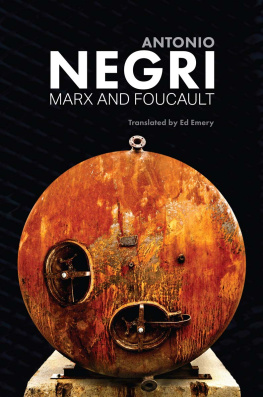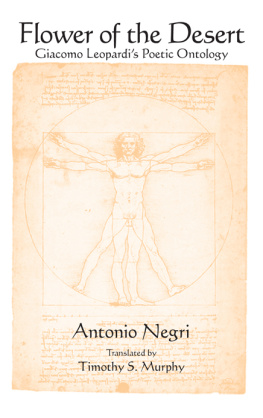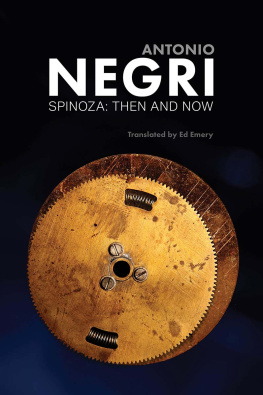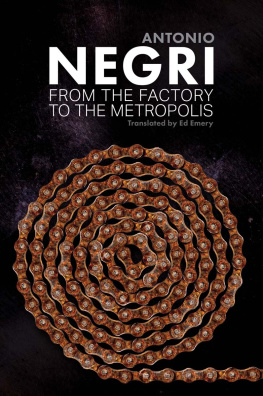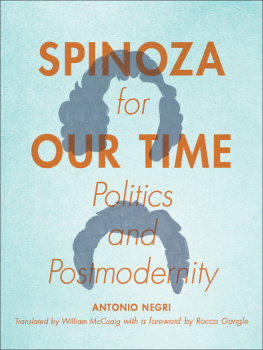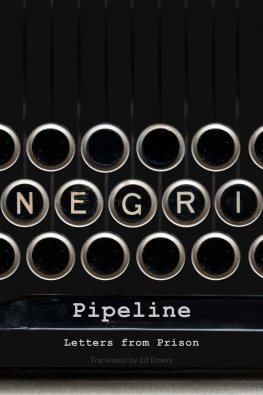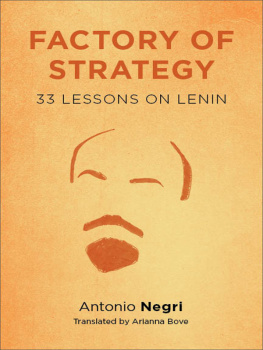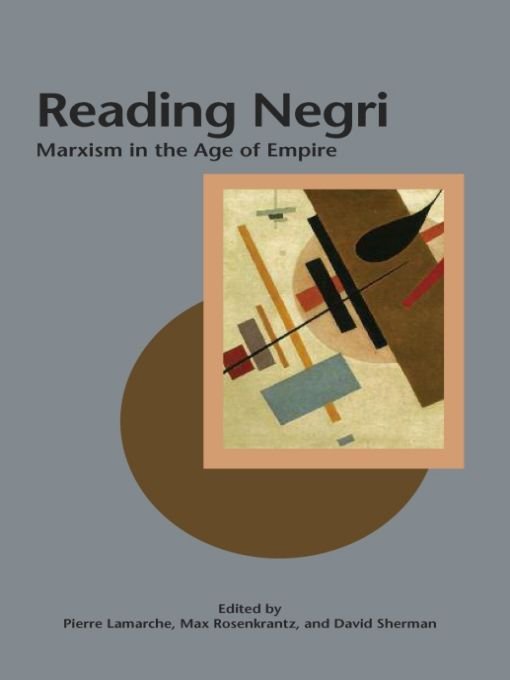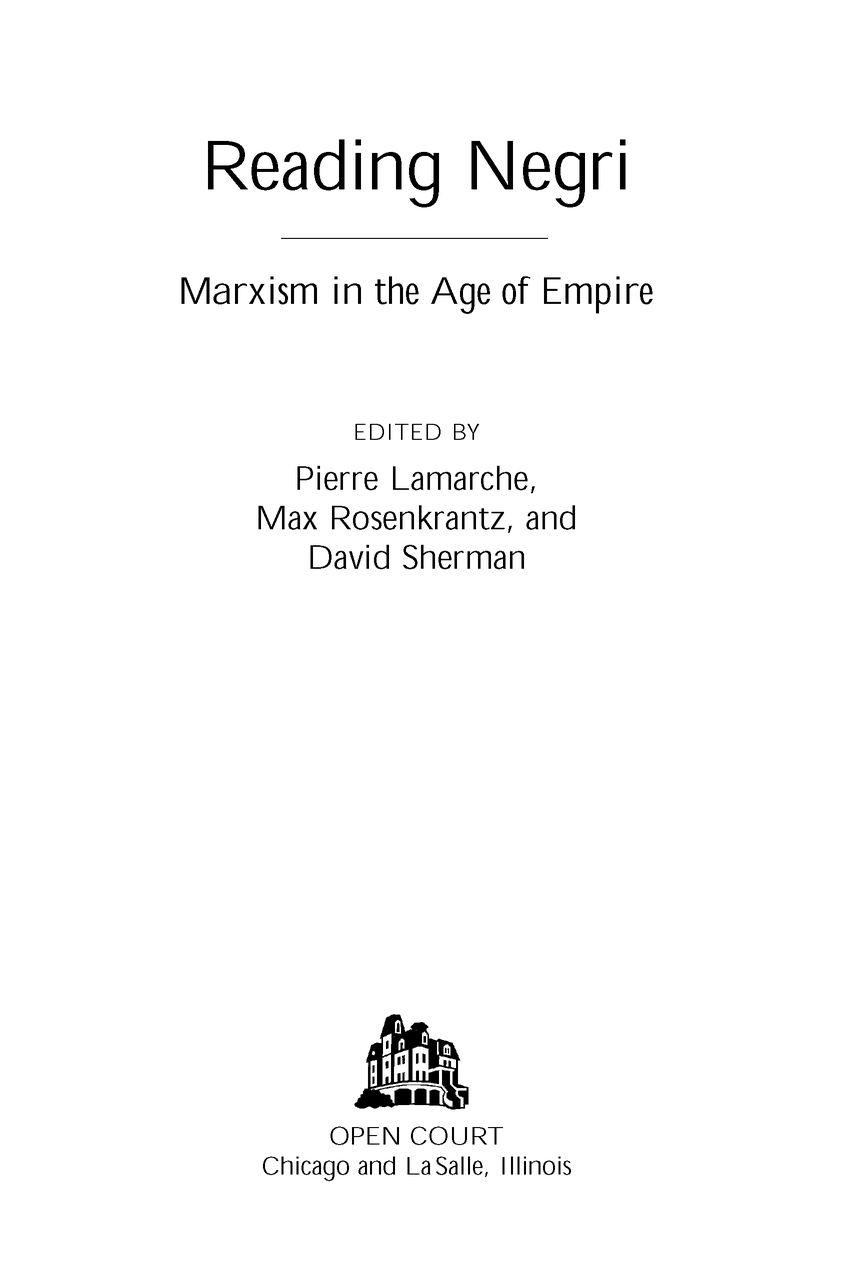Table of Contents
Series: Creative Marxism
Series Editor: Bill Martin
Volume 1: Ethical Marxism: The Categorical Imperative of Liberation by Bill Martin
Volume 2: Marxism and the Call of the Future: Conversations on Ethics, History, and Politics by Bob Avakian and Bill Martin
Volume 3: Reading Negri, edited by Pierre Lamarche, Max Rosenkrantz, and David Sherman
For Harry Cleaver, teacher and friend
Political Biography and Selected Bibliography of Antonio Negri
Antonio Negri was born in 1933 in Padua, Italy. His first forays into social and political activism date from his days as a philosophy student at Padua University where he first became involved with the student catholic activist organization Giovent Italiana di Azione Cattolica. He was expelled from this group in 1954 as a result of a crackdown upon Azione Cattolicas spokesman, Mario Rossi, that was imposed by none other than Pope Pius XII. Shortly thereafter, Negri joined another leftist catholic group, Intesa, but resigned from that organization in 1958, frustrated by the meddling of the bishop of Padua in its affairs, particularly what the bishop viewed as its socialist tendencies. In 1956 Negri produced a dissertation on German historicism, which earned him a graduate degree in philosophy, and, after additional study at the Benedetto Croce Institute for Historical Studies, obtained in 1959 a professorship in the Philosophy of Law at Padua University.
Having abandoned the catholic activist organizations of his schooldays in the face of the conservative, reactionary culture of the Italian catholic churchs hierarchy, Negri had begun to seek out new avenues to pursue the issues of social justice that would remain his lifelong concern. In the same year he obtained his professorship, he was also elected to the post of municipal councilman and he began to direct the journal of the Italian Socialist Party, on whose ticket he had run. However, in 1963a watershed year for Negrihe left the Italian Socialist Party in reaction to its decision to enter into a political alliance with the Christian Democrats. During what has been called the hot summer of 1963, Negri organized reading groups on Marxs Capital among the citys industrial workers, many of whom were employed in the petrochemical industry. Around this time, moreover, Negri was involved in two revolutionary periodicals. The first, Potere Operaio (Workers Power), was of a more practical nature, as it addressed the workers and their political needs directly, while the second periodical, Quaderni Rossi (Red Notebooks), with offices in Turin, Milan, Rome, and Padua, addressed theoretical issues from the workers perspective. Other theorists that were involved in founding Quaderni Rossi included Raniero Panzieri, Romano Alquati, Mario Tronti, and Sergio Bolognaall of whom, like Negri, would become associated with what would become the Autonomist Marxism movement. Other worker publications were founded between 1963 and 1967, as Negri continued to both engage in revolutionary political activities and teach at the University.
The years 19671973 saw an intensification of revolutionary political activity as student and worker struggles in Italy converged in a way that was unprecedented in Europe. During this period, it is clear that Negris positions, as well as the positions of the political movement in general, were moving well to the left of the Italian Communist Party, which was increasingly taken to be reactionary. Groups such as Lotta Continua (Struggle Continues), Avanguardia Operaia (Workers Vanguard), and Movimento Studentesco (Student Movement) arose and shared a common view of Negri as one of their leading theoreticians. The differences between these groups and the Communist Party became especially clear in 1973, when the Communist Party formed an alliance with the Christian Democrats, who, along with the industrial unions, were seeking to extract givebacks from the workers while reducing health and safety precautions and increasing the speed of the production lines.
It was with the birth of autonomous worker committees in the factories during 1973 that Autonomia (Autonomy) first arose. These committees, comprised of younger, more militant workers, responded not only to the particular fact that longstanding institutions such as the Communist Party and the industrial unions no longer represented their interests; they also responded to a more general distrust of institutions as such, regardless of where they stood on the ideological spectrum. It was around this time that Negri began to theorize the historical movement from the mass worker (i.e., the industrial worker producing consumer goods in the factory) to the social worker, a movement that reflects the idea that capital was in the process of moving beyond the workplace and turning society itself into a factory of sorts in order to press the general population into the service of generating profits, and, ultimately, retaining social control for the elite. Negris theory both reflected and influenced the more radical elements of society, as social groups not previously understood as part of the proletariat by classical Marxist theorysuch as housewives, students, and environmentalistscame together with the industrial workers in social protest on the grounds that all were being instrumentalized by capital.
Padua itself was hit hard by the protests, and various acts of violence occurred. Criminally charged with inciting the protests, Negri fled to Paris, where he began teaching at the cole Normale, then run by the French philosopher Louis Althusser, who was trying to make sense of Marxism in structuralist terms. (One of the courses Negri taught at the cole Normale formed the basis for his book Marx Beyond Marx: Lessons on the Grundrisse.) Although Negri was cleared of the criminal charges in 1977, he continued to teach in France until 1979. On returning to Italy, however, and along with other prominent left-wing intellectuals linked to Autonomia, Negri was arrested on charges that were unspecified though allegedly in connection with the kidnapping and murder of the Italian industrialist Aldo Moro by the Red Brigades, a case that was then receiving international attention. Despite the fact that Negri had no known connection with the Red Brigades (and, indeed, although its top-down style was anathema to the principles of autonomism), he remained in jail for five years without going to trial.
In 1983, while still in jail, Negri ran for office in a national election and received enough votes on the national Radical Party ticket to lead it in Parliament. Under a then-existing law that provided prosecutorial immunity for members of Parliament, Negri was freed from jail. In September of that year, however, Negri was stripped of his parliamentary immunity, and he once again fled to Paris. From 1983 to 1997, he taught at the Universit de Paris VII (St. Denis) and the College Internationale de Philosophie. Although a condition of his residence in France was that he refrain from engaging in political activities, Negri continued to write, to engage in productive collaborations with such French philosophers as Giles Deleuze, Flix Guattari, and Yann Moulier, and he founded the journal Futur Antrieur.
Negri returned to Italy in 1997, at which time he was arrested and jailed at Rebibbi Prison in Rome, where he continued to write. In 2000 Negris book


